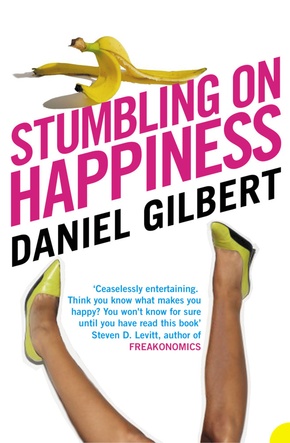
Stumbling on Happiness - Winner of Wissenschaftsbuch des Jahres 2007
| Verlag | HarperCollins UK |
| Auflage | 2007 |
| Seiten | 739 |
| Format | 12,9 x 19,8 x 2,0 cm |
| Gewicht | 220 g |
| Artikeltyp | Englisches Buch |
| ISBN-10 | 0007183135 |
| EAN | 9780007183135 |
| Bestell-Nr | 00718313EA |
In this fascinating and often hilarious work, pre-eminent psychologist Daniel Gilbert shows how - and why - the majority of us have no idea how to make ourselves happy. The drive for happiness is one of the most instinctive and fundamental human impulses - but do we actually have the first idea how to achieve it, maintain it, or even, for that matter, what it is? In this revealing and witty investigation, pioneering psychologist, Daniel Gilbert uses his ground-breaking research, philosophy and real-life case studies to illustrate how our basic drive to satisfy our desires is not only often misguided, but also intrinsically linked to some of the most long-standing and contentious questions about human nature. Combining lively prose, fresh analysis, much-awaited findings and considerable erudition,"Stumbling On Happiness"is a fascinating and engaging look at what it means to be a human being on a perennial quest for happiness.
In this fascinating and often hilarious work - winner of the Royal Society of Science Prize 2007 - pre-eminent psychologist Daniel Gilbert shows how - and why - the majority of us have no idea how to make ourselves happy.
In this fascinating and often hilarious work - winner of the Royal Society of Science Prize 2007 - pre-eminent psychologist Daniel Gilbert shows how - and why - the majority of us have no idea how to make ourselves happy.
We all want to be happy, but do we know how? When it comes to improving tomorrow at the expense of today, we're terrible at predicting how to please our future selves.
In 'Stumbling on Happiness' Professor Daniel Gilbert combines psychology, neuroscience, economics and philosophy with irrepressible wit to describe how the human brain imagines its future - and how well (or badly) it predicts what it will enjoy. Revealing some of the amazing secrets of human motivation, he also answers thought-provoking questions - why do dining companions order different meals instead of getting what they want? Why are shoppers happier when they can't get refunds? And why are couples less satisfied after having children while insisting that th eir kids are a source of joy?
